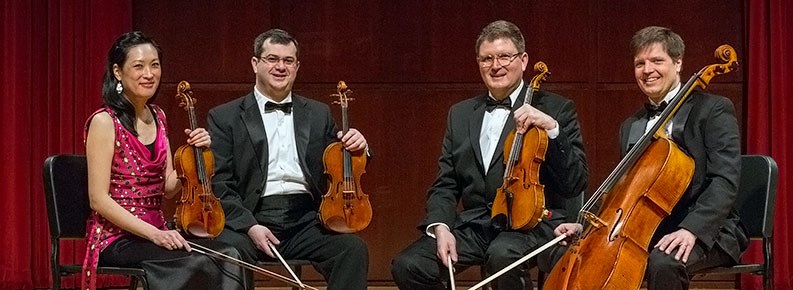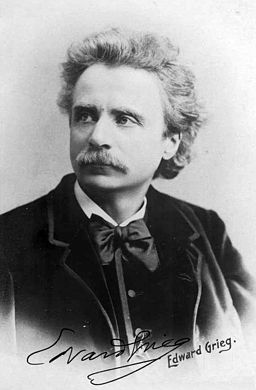Two Different Kinds of Romance
Philomusica Quartet plays romantic works by Grieg and Dvorak and a Bruckner rarity.
The Philomusica Quartet has titled their next concert this Monday, February 18, Brilliance and Romance. Selecting romantic music suitable for mid-February, they have also chosen works of great quality less often performed. The Philomusica Quartet (violinists Jeanyi Kim and Alexander Mandl, violist Nathan Hackett and cellist Adrien Zitoun) will perform at Wisconsin Lutheran College where the serve as resident quartet.
An early work on the program represents Joseph Haydn at his most advanced. The String Quartet in G major, Opus 77, No 1, Hob. III 81 (1799) demonstrates that Haydn was moving at the end of his career in the same innovative directions that Beethoven was as his career began. The quartet features an energetic allegro opening, a virtuoso role for first violin, two presto movements and an upbeat mood throughout.
The beautiful second movement, organized as a rondo, features ‘vocal’ lines throughout. The presto Minuetto – a scherzo in all but name — sets up for a dazzling finale. The pace established by others challenges the first violin who is to play three times as fast. A Hungarian style dance melody supplies the energy.
Also on the program: Edvard Grieg‘s first quartet, which demonstrates a mastery of the form as well. A well-integrated work, his String Quartet No, 1 in G minor, Op. 27 (1877-78) gains its strength from motivic elements rather than melodies. The work opens with a simple motive from a song by Grieg – The Minstrel’s Song. The rhythmic elements, however, are what matter. The single melodic line appears with variations throughout the work. Occasionally, it is tranquil – but more often the sounds are either more harsh or contain elements of dance.
An Andantino second movement serves up the melodic line as a lush Romanze. Contrasting sections introduce an agitated motif. The contrasting fast sections tend to make the romantic melody all the more lush. The third movement Intermezzo takes its scherzo from the rhythms of a Norwegian country dance. A lively saltarello – a 16th-century Italian jumping dance — dominates the finale.
Two short pieces complete the program.
Enthusiasts of Antonín Dvořák recognize his ability to create unforgettable melodies. The Philomusica has chosen one of his most romantic for this February concert.
Early in his career, Dvořák wrote a string quartet for a performing group who choose not to perform it. Dvořák recognized the value of its Andante movement and wrote a version of that for violin and piano. A subsequent version for violin and orchestra thrives in the repertory as Romance in F minor for violin and orchestra, Op. 11. The Philomusica will play the single movement from the quartet – Romance from String Quartet No. 5 in F minor, Op. 9 (1873). This short work serves best as the Valentine’s bon-bon for the evening, but also invites parallels with the Grieg Romanze movement.
Anton Bruckner, on the other hand, inspires because of the power and sweep of his symphonies and religious choral works. He wrote few works for chamber settings. Some chamber music written as a part of composition lessons were not intended for performance or publication. These works were unearthed by musicologists and first published 123 years later. An entire student quartet may be too esoteric to program. But the concluding rondo from his 1862 string quartet offers a unique window into Bruckner’s insight into chamber composition.
Bruckner’s Rondo in C minor for String Quartet (1862) offers an additional challenge to the Philomusica Quartet. Bruckner did not bother to add performance annotation, so the Quartet has needed to determine for themselves how to interpret the work.
Come for the romance, but admire the brilliance of these well-chosen works.
Philomusica will hold their concert Monday, February 18th at 7:30 p.m. at Wisconsin Lutheran College, Center for Arts and Performance, Schwan Concert Hall located at 8815 W. Wisconsin Ave., Milwaukee, WI 53226. Free parking is available in a parking garage to the east of the hall. Tickets can be purchased for $25 online or by calling the box office at 414-443-8802.
The Philomusica Quartet will return to Wisconsin Lutheran College on Monday, April 8th, 2019 for a unique concert featuring Franz Joseph Haydn‘s “The Seven Last Words of Christ on the Cross” for String Quartet, Op. 51.





















